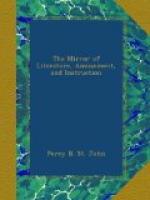can interpose obstacles powerful enough to quell the
enterprise of man!—that the rocky caverns
of the loneliest sea-coasts, and the deepest recesses
of inland forests, are insufficient to protect from
him the most terrible beasts of prey which inhabit
them;—and that, in short, all the kingdoms
of nature pay tribute to his sagacity or his power,
his courage or his curiosity. This feeling is
heightened, amidst the scene we have attempted to describe,
by still more numerous representatives of the feathered
race. Birds of the boldest wing and brightest
hues—the denizens of the woods and the
waters—of every variety of plumage, habit,
song, and size—from the splendid macaw
and toucan to the uncouth pelican and the shapeless
puffin—from the gigantic ostrich to the
beautiful but diminutive golden wren; in short, all
the birds which are congregated in this spot come,
literally, from every corner of our globe. The
great alpine vulture may have sailed above the heights
of Hohenlinden; the Egyptian vulture have roosted
on the terraced roofs of Cairo, or among the sacred
walls of Phylae; the condor, have built in the ruined
palaces of the Incas of Peru; the flamingo or the
ibis have waded through the lakes and marshes which
surround the desolation of Babylon; the eagle of America
have ranged, perhaps daily, over those narrow straits
which separate two worlds and bid defiance to all
navigation! The emu has long since tracked the
vast interior of that fifth continent whose inland
rivers, tribes of mankind, quadrupeds, and mineral
and vegetable productions, remain still, to us, sealed
mysteries. The crowned crane has drawn its food
from the waters of that vast lake of Tschad, in the
search for which so many Europeans have perished;
the little stormy petrel, borne on the surge, or wafted
by the gale, has travelled to every shore that has
been visited by the tempests in which it loves to rove;
and the wandering stork, like the restless swallow,
has nestled, indifferently, among the chimneys of
Amsterdam, the campaniles of Rome or of Pisa, and
on the housetops of Timbuctoo. In looking round
upon these various birds and quadrupeds of all the
regions of our globe—in considering the
distant countries of their birth—their strangeness
to us in feature or in form—the endless
varieties of their instincts, their habits, their
affections, their antipathies, their appetites—the
several important offices they are destined to perform
in what may be called the physical economy of the
world,—in observing the powers of offence
in some, of defence in others, and the astonishing
means which have been supplied to certain classes
of them destitute both of one and the other, of procuring
their subsistence with equal facility,—it
is surely impossible not to ascend to the contemplation
of that all-wise and benevolent Power which has called
all these creations into being, and thus informed
and thus endowed them!”
* * * * *




